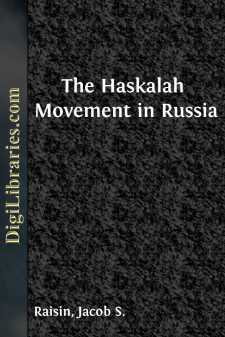Categories
- Antiques & Collectibles 13
- Architecture 36
- Art 48
- Bibles 22
- Biography & Autobiography 813
- Body, Mind & Spirit 142
- Business & Economics 28
- Children's Books 17
- Children's Fiction 14
- Computers 4
- Cooking 94
- Crafts & Hobbies 4
- Drama 346
- Education 46
- Family & Relationships 57
- Fiction 11829
- Games 19
- Gardening 17
- Health & Fitness 34
- History 1377
- House & Home 1
- Humor 147
- Juvenile Fiction 1873
- Juvenile Nonfiction 202
- Language Arts & Disciplines 88
- Law 16
- Literary Collections 686
- Literary Criticism 179
- Mathematics 13
- Medical 41
- Music 40
- Nature 179
- Non-Classifiable 1768
- Performing Arts 7
- Periodicals 1453
- Philosophy 64
- Photography 2
- Poetry 896
- Political Science 203
- Psychology 42
- Reference 154
- Religion 513
- Science 126
- Self-Help 84
- Social Science 81
- Sports & Recreation 34
- Study Aids 3
- Technology & Engineering 59
- Transportation 23
- Travel 463
- True Crime 29
The Haskalah Movement in Russia
by: Jacob S. Raisin
Categories:
Description:
Excerpt
CHAPTER I
THE PRE-HASKALAH PERIOD
"There is but one key to the present," says Max Müller, "and that is the past." To understand fully the growth and historical development of a people's mind, one must be familiar with the conditions that have shaped its present form. It would seem necessary, therefore, to introduce a description of the Haskalah movement with a rapid survey of the history of the Russo-Polish Jews from the time of their emergence from obscurity up to the middle of the seventeenth century.
Among those who laid the foundations for the study of this almost unexplored department of Jewish history, the settlement of Jews in Russia and their vicissitudes during the dark ages, the most prominent are perhaps Isaac Bär Levinsohn, Abraham Harkavy, and Simon Dubnow. There is much to be said of each of these as writers, scholars, and men. Here they concern us as Russo-Jewish historians. What Linnaeus, Agassiz, and Cuvier did in the field of natural philosophy, they accomplished in their chosen province of Jewish history. Levinsohn was the first to express the opinion that the Russian Jews hailed, not from Germany, as is commonly supposed, but from the banks of the Volga. This hypothesis, corroborated by tradition, Harkavy established as a fact. Originally the vernacular of the Jews of Volhynia, Podolia, and Kiev was Russian and Polish, or, rather, the two being closely allied, Palaeo-Slavonic. The havoc wrought by the Crusades in the Jewish communities of Western Europe caused a constant stream of German-Jewish immigrants to pour, since 1090, into the comparatively free countries of the Slavonians. Russo-Poland became the America of the Old World. The Jewish settlers from abroad soon outnumbered the native Jews, and they spread a new language and new customs wherever they established themselves.
Whether the Jews of Russia were originally pagans from the shores of the Black and Caspian Seas, converted to Judaism under the Khazars during the eighth century, or Palestinian exiles subjugated by their Slavonian conquerors and assimilated with them, it is indisputable that they inhabited what we know to-day as Russia long before the Varangian prince Rurik came, at the invitation of Scythian and Sarmatian savages, to lay the foundation of the Muscovite empire. In Feodosia there is a synagogue at least a thousand years old. The Greek inscription on a marble slab, dating back to 80-81 B.C.E., preserved in the Imperial Hermitage in St. Petersburg, makes it certain that they flourished in the Crimea before the destruction of the Temple. In a communication to the Russian Geographical Society, M. Pogodin makes the statement, that there still exist a synagogue and a cemetery in the Crimea that belong to the pre-Christian era. Some of the tombstones, bearing Jewish names, and decorated with the seven-branched Menorah, date back to 157 B.C.E.; while Chufut-Kale, also known as the Rock of the Jews (Sela' ha-Yehudim), from the fortress supposed to have been built there by the Jews, would prove Jewish settlements to have been made there during the Babylonian or Persian captivity.
Though the same antiquity cannot be established for other Jewish settlements, we know that Kiev, "the mother of Russian cities," had many Jews long before the eighth century, who thus antedated the Russians as citizens....


